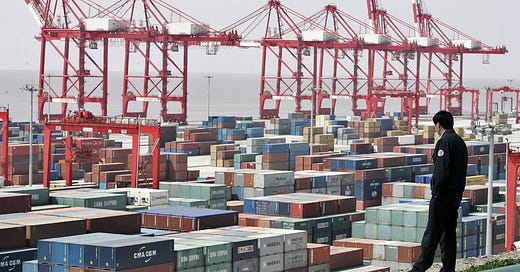CUSMA 2026: An Opportunity To Combat China's Overproduction
Over the past few decades, China's rapid progression from an agrarian society to an industrial behemoth has relied almost exclusively on state subsidies and high, burdensome entry barriers for foreign companies. In conjunction with cheap money for domestic enterprises, this mix has evolved into a serious threat to the West's economic and national security interests. To fuel economic growth within China, the Chinese Communist Party (CCP) has relied on overproduction to ensure social and economic tranquillity. To maintain peace within China, the goods and products that are overproduced must be exported to Western Nations, who have historically served as a dumping ground. We have also seen China's neighbouring countries, such as Vietnam, South Korea, and Australia, be flooded with cheap Chinese goods that domestic companies can't compete with.
This has led to a significant challenge for policymakers in the West: How can we manage the challenges of Chinese overproduction and the dumping of goods in the global market whilst mitigating the risk of escalation towards conflict?
CUSMA 2026 presents North America with an opportunity to do just that. Under the current CUSMA process, Canada, the United States, and Mexico review dumping allegations independently and would sometimes (the key word here being 'sometimes') coordinate a unified response. This is the exception, however, and not the rule. For example, in May of this year, the United States imposed tariffs on Chinese steel, aluminum, and electric vehicles. Yet, Canada took over four months to reach the same conclusion. To add insult to injury, our tariffs aren't set to come into effect until October 1, 2024.
This unnecessary delay is completely unacceptable. Everyone knows how deeply interconnected the North American auto sector is and where the resources required to build its cars come from. Spending over four months to reach the same logical conclusion as the United States is quintessential of this Liberal government. Industry, labour, and trade experts have been well aware of the risk of Chinese goods being dumped into our market and have voiced those concerns repeatedly. So, it begs the question, why didn't we impose tariffs in a coordinated manner with our most important ally?
One word: Inattention.
Why was the Government of Canada not engaged with the United States to impose a coordinated response? Why did the Government of Canada take four months to reach the same conclusion as the United States regarding the dumping of Chinese steel, aluminum, and electric vehicles? Why did the Government of Canada delay the imposition of tariffs until October 1, 2024?
The answer to these questions - even if we consider the Liberal government's actions in good faith - isn't pretty. On the one hand, the Americans may have acted unilaterally without consulting Canada, which would be greatly embarrassing for us, considering the vast resources we spend on our relationship, the billions of dollars in trade between Canada and the United States, and our history as allies and partners.
On the other hand, if the Liberal Government was consulted and didn't believe Chinese dumping posed a risk to the Canadian economy, only a relenting public outcry would have forced it to act. Even if we give the Liberals the benefit of the doubt and assume they were consulted by the White House and were notified in advance of the American's intention to impose tariffs, the internal decision-making process through PMO and GAC was so slow and cumbersome that Canada couldn't respond quickly and efficiently. Neither of these scenarios bodes well for Canada.
Why Use CUSMA
The forthcoming CUSMA review offers Canada a great opportunity. Through it, we can build a robust and unified North America with an economic barrier for countries that do not abide by acceptable trade practices. When tariffs and regulatory trade action are imposed by countries individually – especially by one as small as Canada – larger nations can impose a disproportionate response (see canola). In response, a mechanism within CUSMA that consists of a trade review panel of Canadian, American, and Mexican officials to review dumping and unfair trade allegations by China should be established. This will ensure that the North American market is using environmentally conscious resources and goods that create North American jobs that don't derive from forced labour.
Tariffs and retaliatory trade action within the North American context must be implemented as a group. Individual countries (be it Canada, the United States, or Mexico) imposing their own tariffs and trade remedies only create an assortment of trade barriers and regulations that further complicate business moving throughout the continent. Doing so also leaves open the possibility of a backdoor to each other's markets.
Looking Forward
What will be needed to accomplish this? Diplomacy, trust, and cooperation in good faith.
Will it be easy? No. But we need to try.
Goods dumped into North America's three major markets do more harm to the continent than good. A renewed focus on collective action by Canada, the United States, and Mexico will keep unwanted goods out. This will ensure we have the economic security required to support future economic growth.




